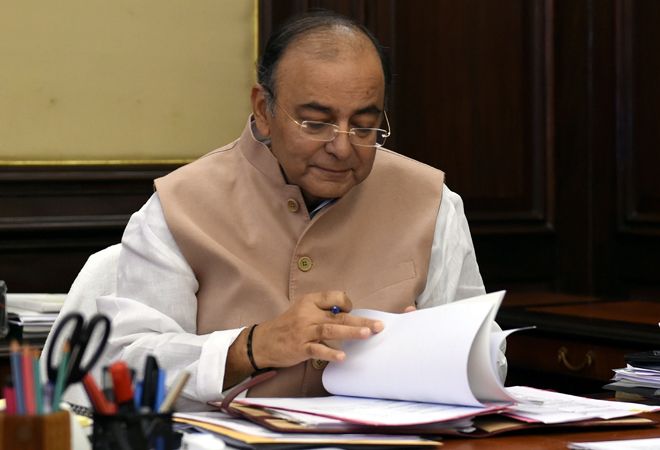Squeezing spending or ramping up revenue collections hugely in the last month of the financial year does not suggest a fiscally prudent path for any government, says AK Bhattacharya.
 At the end of February this year, Finance Minister Arun Jaitley had promised Parliament that he would bring down the government's fiscal deficit for 2014-15 to Rs 5.13 lakh crore (Rs 5.13 trillion) or 4.1 per cent of gross domestic product (GDP).
At the end of February this year, Finance Minister Arun Jaitley had promised Parliament that he would bring down the government's fiscal deficit for 2014-15 to Rs 5.13 lakh crore (Rs 5.13 trillion) or 4.1 per cent of gross domestic product (GDP).
Last week, the Controller General of Accounts put out the government's expenditure and revenue numbers for the April-February period of 2014-15.
They revealed that the government's fiscal deficit number at the end of 11 months of the year was almost Rs 90,000 crore (Rs 900 billion) in excess of what should be the full year's deficit figure.
A couple of days later, the finance ministry also released the total indirect taxes collected during the whole of 2014-15, which stood at Rs 10,000 crore (Rs 100 billion) more than what was projected in the revised estimates for the year.
This, taken together with the telecom spectrum auction proceeds and the reduced oil subsidy burden due to falling international crude oil prices, is being interpreted as a positive development for the government.
The finance minister, it has been argued, will also be able to show a steep fall in the government's expenditure in the last month of 2014-15, which should help him fulfil the fiscal deficit promise he made to Parliament on February 28.
Were the Budget numbers that the finance minister had promised to Parliament too optimistic?
Would these targets be met? And would meeting the target require some last-minute efforts at mobilising additional revenues and severe curtailing of expenditure?
The past is often a good indicator of the future. What happened in 2013-14 could, thus, be a reliable pointer for 2014-15.
For the period of 11 months at the end of February 2014, the Controller General of Accounts had put out a fiscal deficit number that exceeded the fiscal deficit estimate for the full year of 2013-14 by almost Rs 75,000 crore.
The revised fiscal deficit estimate for the whole of 2013-14 had been estimated at Rs 5.25 lakh crore (Rs 5.25 trillion), but the deficit for the first 11 months of that year had already touched the Rs 6-lakh-crore mark. Serious doubts were then expressed about how the fiscal deficit target would be met.
But proving all such doubters wrong, the actual fiscal deficit for the 12 months of 2013-14 was later revealed to be only Rs 5.03 lakh crore (Rs 5.03 trillion).
In other words, the excess of Rs 75,000 crore (Rs 750 billion) was not only wiped out, but even an additional gain of over Rs 22,000 crore (Rs 220 billion) was recorded. And all this took place in the space of one month.
This seemingly magical act was largely achieved by an increase in disinvestment proceeds of around Rs 25,000 crore (Rs 250 billion) in the month of March 2014 and containment of expenditure to less than what had been budgeted for.
If this could be achieved in 2013-14, there is no reason why Jaitley would fail to achieve his final fiscal deficit numbers for 2014-15.
The excess amount at Rs 75,000 crore (Rs 750 billion) is much smaller than what the challenge was in 2013-14.
But even when these targets are met, what should worry fiscal policy experts is the manner in which the government's expenditure has been planned.
Squeezing expenditure or ramping up revenue collections hugely in the last month of the financial year does not suggest a fiscally prudent or responsible path for any government.
The finance ministry has already mandated a specific share of annual expenditure to be spent in different quarters, so that there is no bunching of spending at the end of the year.
But this bunching seems to have been allowed to continue and which is why the government finds it convenient to contain expenditure even in the last month of the year and meet the full year's deficit target.
Similarly, the revenue flows, too, should be evenly spread out according to a pre-ordained plan.
This would ensure greater efficiency of revenue mobilisation without introducing distortions in the system of tax collection or even coercion for meeting a target by the end of the year.
So, the worry before Jaitley is not whether the fiscal deficit targets as promised by him to Parliament will be met when the actual numbers get collated.
The real and more disturbing worry is that the manner of revenue collection and government spending needs further reforms to ensure greater efficiency and, more importantly, eliminate sub-optimal last-minute expenditure or coercive revenue collection.
Image: Finance Minister Arun Jaitley
Photograph: Reuters










 © 2025
© 2025